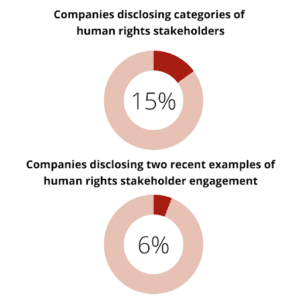Ensuring corporate respect for human rights is fundamentally about people, revolving around how companies become aware of, prevent, mitigate and remediate actual and potential negative impacts on the rights of individuals and communities. Respecting the rights of these people can only be done effective by seeking to understand their experiences and perspectives. In other words, engaging with stakeholders is essential if companies are serious about respecting human rights and undertaking human rights due diligence.
According to the UN High Commissioner for Human Rights, stakeholder engagement is “an ongoing process of interaction and dialogue between a company and its potentially affected stakeholders that enables the company to hear, understand and respond to their interests and concerns, including through collaborative approaches”. Meaningful stakeholder engagement can help companies to understand the perspectives and priorities of those who are or may be affected, improve the quality of human rights impact analyses, and better understand how to manage identified impacts. For example, a company might engage with workers to better understand factors that contribute to forced labour and find out that a labour provider is charging recruitment fees. This knowledge helps the company in addressing the issue effectively. By truly putting people at the heart of human rights due diligence, companies can make better-informed decisions and ensure their activities to address negative impacts are tailored to stakeholders’ needs and experiences.
Ineffective stakeholder engagement or a lack thereof altogether, on the other hand, can directly contribute to negative human rights impacts through a failure to address stakeholder concerns early and effectively before they escalate. This also highlights why grievance mechanisms are not a substitute for broad stakeholder engagement. Having a grievance mechanism, however good, without stakeholder engagement processes risks signalling to affected stakeholders that the company only wants to hear from them when negative impacts have already occurred, thereby limiting the company in signalling and addressing risks early on.
Poor implementation of stakeholder engagement
While implementation guides focusing on stakeholder engagement are increasingly available, such as those by the Global Partnership Project and UN Global Compact, recent research by the World Benchmarking Alliance (WBA) demonstrates that the vast majority of companies are failing to demonstrate effective stakeholder engagement in practice.
 Through its Social Baseline Assessment, WBA assessed 1,000 of the world’s most influential companies on the fundamentals of stakeholder engagement by asking companies to a) disclose the categories of stakeholder whose human rights have been or may be affected by its activities, and b) provide two examples of engagement with them in the last last two years. Worryingly, these requirements were met by only 15% and 6% of the world’s most influential companies. In fact, out of all eight indicators assessing respect for human rights, companies performed most poorly on stakeholder engagement.
Through its Social Baseline Assessment, WBA assessed 1,000 of the world’s most influential companies on the fundamentals of stakeholder engagement by asking companies to a) disclose the categories of stakeholder whose human rights have been or may be affected by its activities, and b) provide two examples of engagement with them in the last last two years. Worryingly, these requirements were met by only 15% and 6% of the world’s most influential companies. In fact, out of all eight indicators assessing respect for human rights, companies performed most poorly on stakeholder engagement.
85% of companies failed to disclose the categories of stakeholders whose human rights are at risk due to the company’s activities. This implies that they either do not know who these groups are or that they do not find it important enough to disclose them. Both are problematic, albeit in different ways. When companies lack awareness about who their key human rights stakeholders are, it casts doubt on how effective and meaningful their engagement activities are in the first place. A lack of transparency around the prioritisation of human rights stakeholders by the company, on the other hand, prohibits other stakeholders and NGOs from understanding who is at least on the company’s radar, and highlighting potentially missed groups.
94% of companies failed to provide two examples of engaging with human rights stakeholders over the last two years. Through disclosing examples, companies demonstrate their stakeholder engagement processes are more than paper tigers and allow for the external evaluation of their implementation in practice. In addition, such evidence of the company’s actions can serve to build trust with other stakeholder groups.
A call for increased action and transparency
Companies must both know and show how they respect human rights, which should include how they engage with relevant stakeholders. Our research has demonstrated that companies still have a lot of ground to cover on the basics of stakeholder engagement, both in terms of disclosure and action. Greater transparency on both the challenges and successes of stakeholder engagement is not only key for stakeholders and companies themselves, but it can also enable corporate peer-to-peer learning, allowing other companies to learn from mistakes and implement best practices.
Encouragingly, some leading companies already integrate stakeholder engagement into their efforts to respect human rights, and their experiences can help others looking to start. Explore WBA’s Social Baseline data set to learn more about what companies are doing and get real-life examples.









